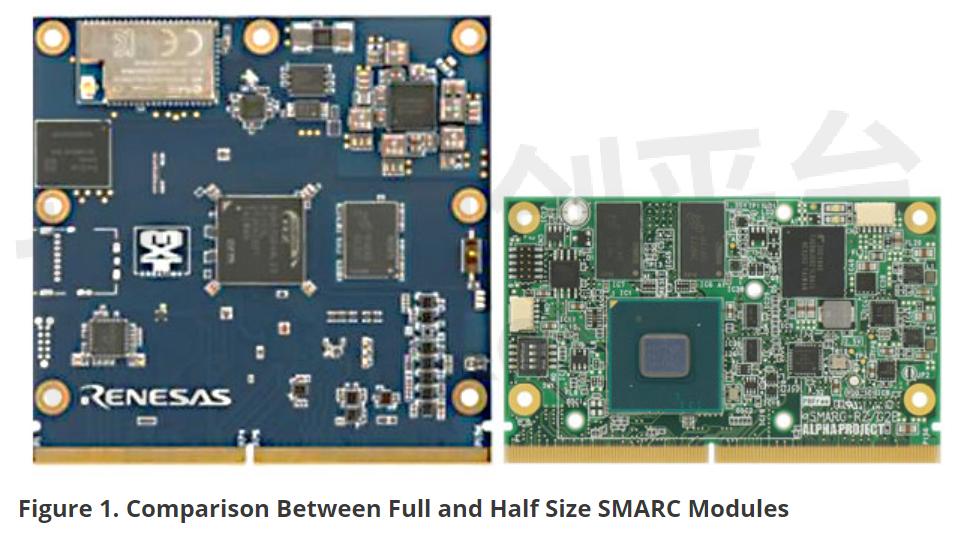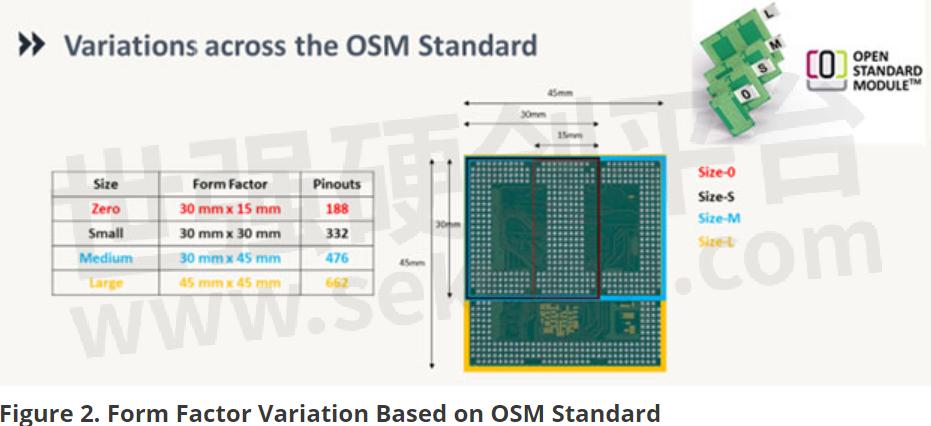How to Accelerate Design Cycle by Giving Customers the Options to Make or Buy SoM and/or SBC




In recent years, we often hear about Make or Buy, Time to Market, Scalability, and Cost optimization. Customers very often are talking or considering the “buy solution” of a coMPUter module when using these phrases. Before diving in into the details, we need some definition.
Definition
A Single Board Computer (SBC) is a complete computer on a single printed circuit board, including the clock, microprocessor, RAM, flash memory, Ethernet, and I/O controllers.
A Computer On Module (COM) or a “System-On-Module" (SoM) typically does not have I/O sockets for direct connection to peripherals. They must be plugged into the main board (often called Carrier Board or Base Board), which completes the I/O pathways to the outside world.
This approach is very common because an end customer can focus on developing the core competence (e.g., POS, factory automation, medical) as below:
A customized baseboard with specific I/Os
An add-on card (e.g., M.2 form factor on the baseboard)
Software running on the baseboard
Form Factors
It is easier said but the devil is in the detail. While an SBC is driven by the application itself, customers are developing the solution based on the requirements of the selected fitting SoM that varies in several circumstances. This section gives an overview of acronyms and major form factors. Major form factors are defined by SGET. SGETs major focus is Arm architecture, therefore we are looking carefully at SGETs initiatives.
SGET “Standardization Group for Embedded Technologies”

The Standardization Group for Embedded Technologies – or in short SGET – is an international not-for-profit association of companies and organizations that collaboratively develop independent specifications for embedded computer technology. SGET e.V. is a registered technical, scientific, and educational association organized under German law. The purpose is to provide a platform to define and market open industry standards for embedded technologies.
SGET Goals:
Provide a platform to grow embedded industry specifications with low overhead and high performance
Truly globally oriented, not limited to Europe
Define market industry standards without bureaucracy
Free access and download to all specifications without limits
Broad and open organization
Independent specification/working groups for embedded technologies (Hardware, Software, Systems, Interfaces, Mechanics, …)
Since 2021, RENESAS is a member of SGET e.V. It is important that Renesas and SGET share our experiences in MPU designs as well as get feedback from the field on what is required.
SMARC “Smart Mobility ARChitecture”
The SMARC® (“Smart Mobility ARChitecture”) is a versatile small form factor computer module in definition targeting applications that require low power, low costs, and high performance.
The modules will typically use Arm SoCs similar to or the same as those used in many familiar devices such as tablet computers and smartphones.
Two module sizes are defined: 82mm x 50mm and 82mm x 80mm.
The module PCBs have 314 edges with a low profile 314-pin 0.5mm pitch right angle pin connector
Third Spec in discussion
The latest Spec is 2.1, and currently, SGET is working on a new smaller form factor.

OSM (Open Standard Modules™)
The idea of all Open Standard Modules™ is to create a new, future proof and versatile standard for small-size, low-cost embedded computer modules, combining the following key characteristics:
Completely machine processible during soldering, assembly, and testing
Different possible packages for direct PCB soldering without a connector
Pre-defined soft- and hardware interfaces
Open-Source in soft- and hardware
The Open Standard Module™ (OSM) specification allows for developing, producing, and distributing embedded modules for the most popular MCU32, Arm and even x86 architectures. For a growing number of IoT applications, this standard helps to combine the advantages of modular embedded computing with increasing requirements regarding costs, space, and interfaces. This standard also enables different form factors, such as SMARC and proprietary to be created, and help developers to easily scale their development.

Proprietary Form Factors
Most used modules are still based on proprietary. Even OEM customers are developing and producing computer modules for themselves to separate the processing unit from the application and split development into two different groups. Proprietary solutions allow either to focus on a specific SoC without losing any features of an SoC or focus on specialties, which can be driven by the application or the focus of one major feature, e.g., shrinking the size.
Benefit for Customers
The major benefit of using SoMs or SBCs, is the split of needed knowledge and resources. When buying a SoM or a SBC, MPU design knowledge is not needed as this is outsourced to an MPU specialist. The headache of fast interconnect, the high-speed connections, and the selection of fitting companion chips are gone.
Renesas provides two partner programs to support your development. The RZ Partner Ecosystem program delivers ready-to-go partner solutions based on RZ MPUs to accelerate your board development. On the other hand, the Preferred Partner Program is a hardware-centric partner program where our partners deliver ready-to-use hardware (incl. the BSP) featuring Renesas RZ family MPUs plus Renesas analog, sensors, and connectivity. With both our partner programs, customers can reduce the focus on the hardware and can focus on differentiating their products. Both partner programs deliver solutions and hardware for applications ranging from consumer solutions to all kinds of industrial applications including medical devices.
- |
- +1 赞 0
- 收藏
- 评论 0
本文由叫我大表哥吧转载自Renesas blogs,原文标题为:Giving Customers the Options to Make or Buy SoM and/or SBC to Accelerate Design Cycle,本站所有转载文章系出于传递更多信息之目的,且明确注明来源,不希望被转载的媒体或个人可与我们联系,我们将立即进行删除处理。
相关推荐
RENESAS Provides Gigabit Industrial Ethernet Solution with Latest RZ/N2L MPU, Running at 10Mbps or 100Mbps
Industrial Ethernet and time-sensitive networks (TSNs) are on the rise. They are very common in the industrial communication domain utilizing protocols like EtherCAT or PROFINET. In the past, these systems were running at 10Mbps or 100Mbps; however, the hunger for more speed was inevitable. New systems need to be capable of 1Gbps to further decrease latency and increase the amount of data transferred per second by a factor of 10 simultaneously.
【应用】瑞萨的RZ/G1M嵌入式多核处理器(MPU)帮助相机系统实现了实时图像处理,最大总线频率高达800MHz
瑞萨支持网络摄像机的主要设备,从高分辨率和高清CMOS图像传感器,到具有图像处理功能和显示功能的MPU,到用于摄像机电机控制的MCU。瑞萨还通过提供更智能的图像识别和身份验证应用软件,帮助用户提高产品价值。瑞萨的RZ/G系列MPU扩展了RZ/A MPU的功能,通过摄像头输入、3D图形加速器、全高清视频编解码器和GbE等功能,为图形,多流视频和嵌入式视觉提供高端性能。
Introducing Three examples of AI MPU RZ/V2M real-life applications
Renesas introduces the following three examples of RZ/V2M real-life applications, including security camera (using Object Recognition), fitness application (using Pose Estimation) and AI edge gateway (using Object Recognition, Pose Estimation and so on).
开发人员如何通过RTOS有效利用MPU
描述- 本文探讨了如何利用内存保护单元(MPU)和实时操作系统(RTOS)提高嵌入式应用的安全性和稳定性。文章首先介绍了RTOS的基本概念和任务管理,接着详细解释了MPU的作用和配置方法,特别是在ARM Cortex-M架构中的应用。文章还讨论了如何通过MPU隔离进程,处理进程间通信和异常情况,以及如何配置MPU区域以检测栈溢出。最后,文章提供了使用Cortex-M MPU的建议和最佳实践。
【经验】RZ/T2M使用瑞萨工具生成IAR开发环境软件项目驱动的方法
瑞萨RZ家族发布了最新的MPU型号RZ/T2系列,那么对于该系列MPU如何使用瑞萨软件工具生成IAR开发环境代码呢,如下步骤主要介绍使用瑞萨RZT Smart Configurator工具生成RZ/T2M IAR开发环境软件项目驱动方法。
【经验】解析瑞萨MPU RZ/T1 SPI总线通信功能配置方法
当我们使用瑞萨(Renesas)MPU RZ/T1做项目开发时,基本都会用到SPI总线通信的功能,SPI总线通信速率较快很适合在单片机板级之间进行数据交互,本文将介绍使用瑞萨开发环境配置生成RZ/T1 SPI总线驱动程序的方法。
【经验】解析使用e2 studio开发环境加载瑞萨RZ/T1项目例程方法
在使用瑞萨(Renesas)开发环境e2 studio开发RZ系列MPU时,对于加载项目例程,总是会出现无法加载或者加载项目之后编译报错的情况,本文就e2 studio加载项目例程常见的方法做个介绍。
【经验】瑞萨MPU RZ/T1使用SSC生成EtherCAT CiA402协议栈方法
瑞萨MPU RZ/T1支持EtherCAT网络设计,如何使用协议栈工具生成相对应的EtherCAT从机栈代码呢,本文主要就Beckhoff工具生成EtherCAT CiA402协议栈方法做相关介绍。
RZ/G MPU G2L、LC、UL组
型号- RZ/G3YYY,RZ/G2L,RZ/G2M,RZ/G2LC,RZ/G2UL,RZ/G1M,RZ/G2N,RZ/G1N,RZ/G,RZ/G1C,RZ/G2E,RZ/G1E,RZ/G2H,RZ/G1H,RZ/G3YY,RZ/G3XX,RZ/G3ZZ,RZ/G4X,RZ/G3X,RZ/G3Y,RZ/G4XX,RZ/G3Z
【经验】瑞萨RZ/T2M系列MPU使用IAR开发环境时的调试方法和注意事项
瑞萨RZ/T2M系列MPU可以使用IAR开发环境进行开发,当我们使用IAR开发环境加载一些瑞萨RZ/T2M相关例程项目时,总是会遇到一些编译报错问题,烧写异常问题,此文主要介绍使用IAR开发环境连接调试RZ/T2M系列MPU的方法和一些注意事项。
【经验】瑞萨MPU RZ/T1使用code generator生成SCI的初始代码方法
工程师初次使用瑞萨(Renesas)RZ/T1系列MPU时,可能不知道SCI该如何配置波特率,中断入口,中断标志位等。本文将介绍RZ/T1系列MPU利用code generator生产SCI的配置方法。
RZ/G MPU G2H,M,N,N组
型号- RZ/G3YYY,RZ/G2L,RZ/G2M,RZ/G2LC,RZ/G2UL,RZ/G1M,RZ/G2N,RZ/G1N,RZ/G1C,RZ/G2E,RZ/G1E,RZ/G2H,RZ/G1H,RZ/G3XX,RZ/G3YY,RZ/G3ZZ,RZ/G4X,RZ/G3X,RZ/G3Y,RZ/G4XX,RZ/G3Z
【经验】瑞萨MPU RZ/T1使用中断方式DMA传输的方法介绍
瑞萨(Renesas)MPU RZ/T1系列可以用于工业通信,伺服等领域项目中,这些领域往往需要主控与外设进行大量数据的交互,当我们使用RZ/T1的DMA中断传输功能接收大量数据时,在程序及配置中具体我们该怎么操作呢,本文主要介绍中断方式操作DMA传输的方法。
【经验】解析瑞萨MPU RZ/T1在e2 studio环境下的双核仿真步骤方法
瑞萨(Renesas)RZ/T1为基于32位和64位Arm的高端MPU,广泛应用工业控制领域,本文主要介绍使用瑞萨RZ/T1的双核CR4和CM3在e2 studio下的双核仿真步骤方法,帮助大家快速的进阶RZ/T1项目开发。
电子商城
现货市场











































































































































































































登录 | 立即注册
提交评论